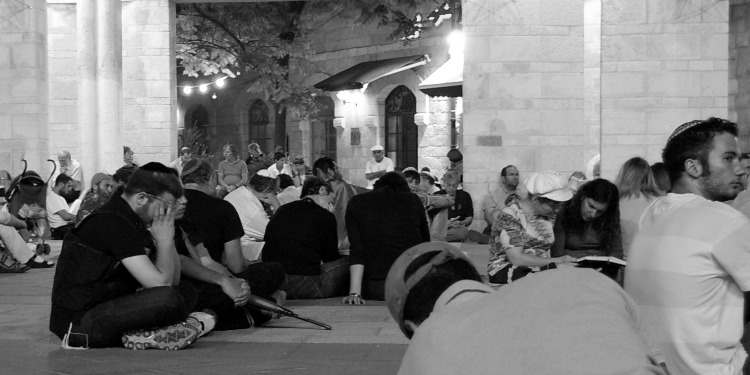Mourning a Temple We Never Knew
The Fellowship | July 31, 2017

When people think of summer they think of blue skies and sandy beaches. They certainly don’t think about sackcloth and ashes. And yet, smack in the middle of that part of year when kids are out of school and many families are vacationing, the Jewish people enter a three week period mourning the destruction of the Temple, culminating with the daylong fast of Tisha B’Av.
Tisha B’Av is the day when both Temples in Jerusalem were destroyed. The First Temple, built by Solomon, was besieged and burned by the Babylonians under Nebuchadnezzar, while the Romans sacked the Second Temple, putting an end to Jewish sovereignty over Jerusalem for nearly two thousand years.
So every year during this three week mourning period the Jewish people go through the motions of mourning. We don’t shave, and we fast to commemorate the sacrifices once offered in the Temple, completing our biblical duty to mourn with fasting on Tisha B’Av.
But how do we truly mourn that which we never met, never experienced, and never saw? The Temple Mount currently houses the Al Aqsa Mosque, not the Jewish Temple. While I have been on the Temple Mount, I have obviously never seen or been in, nor have I met anyone who has seen or been in the Temple. So how do we mourn something that was destroyed so long ago? How can we long to rebuild a Temple which we never personally experienced?
I have long pondered this, especially recently as I have introduced my own children to the concept of mourning the Temple. I want them to appreciate the Temple’s significance in our life as God’s people, and as a Jewish nation, but also on a personal level – what does it mean to each of us as individuals that there is no Temple in Jerusalem?
To begin understanding what it means to live in a world without the Temple I’d like to compare it to an orphan whose entire childhood has been confined inside the walls of an orphanage. Maybe this child believes nothing is lacking in his life. Perhaps he finds it normal for to tuck himself into bed each night, to never feel a warm and comforting embrace or to experience unconditional love, to never beam with pride when his mother smiles at the sight of his latest scribble, to never feel the comfort of his father’s broad shoulders holding him secure on a stormy night.
But one day this little boy will grow up and walk out into a world he has never seen. One day he will sit on a park bench. One day he will see a father playing catch with his son. One day he will watch a mother push her baby on a swing. Then he will realize why he always felt a massive hole in his heart. Then he will realize what he was always missing.
Tisha B’Av, which mourns the destruction of God’s Temple, His physical dwelling place on earth, is exactly that. Despite the fact that we have never entered His holy Temple, we can mourn that which was taken away so long ago, and that which we have faith we will someday experience.
-Ami Farkas
